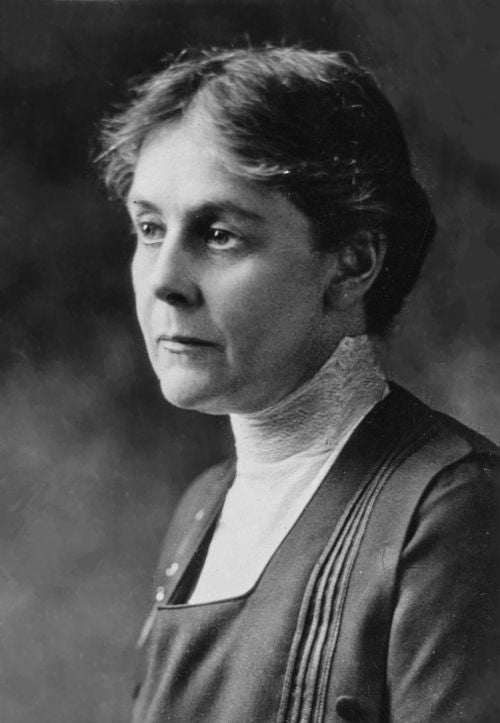Erica Kenney, Meredith Rosenthal honored at 14th annual Alice Hamilton Award lecture

Erica Kenney, associate professor of public health nutrition at Harvard T.H. Chan School of Public Health, was honored for her achievements in research, mentorship, and leadership at the 14th annual Alice Hamilton Award lecture on April 7. The event, presented by the School’s Committee on the Advancement of Women Faculty (CAWF), also recognized Meredith Rosenthal, C. Boyden Gray Professor of Health Economics and Policy, with the Marianne Wessling-Resnick Memorial Mentoring Award.
The Alice Hamilton Award celebrates a female faculty member for her impact in public health and future promise. It honors the memory of Hamilton, a pioneer in the fields of toxicology and occupational health and the first woman appointed to the faculty at Harvard.
“As we gather today to celebrate the legacy of Alice Hamilton, we also honor those who carry forward her pioneering spirit,” said Shoba Ramanadhan, associate professor of social and behavioral sciences, who presented the award to Kenney. She cited Kenney’s groundbreaking research, which seeks to identify efficient and cost-effective strategies for modifying children’s environments to make the healthiest nutrition choices the easiest choices. “Her contributions to public health nutrition, her dedication to advancing equity, and her unwavering commitment to mentorship make her a truly deserving recipient of this honor,” said Ramanadhan.
Helping kids form healthy habits for life
Kenney began her remarks by acknowledging that this is a difficult time for public health and encouraged audience members to reflect on what brought them to the field. “We’re here because we want to save people’s lives, to reduce suffering, and achieve a vision of a world where everyone has dignity, health, and justice as it says on the banners outside of our School,” she said.
Much of Kenney’s research focuses on child nutrition. Many food preferences are formed in early childhood, she said, making this an important stage for interventions that may ultimately help reduce the chronic disease burden in adults. Improving kids’ nutrition isn’t just about educating parents about healthy choices, she said, because food decisions are shaped by a complex web of factors including cost and cultural preferences.
Kenney takes a multipronged approach to addressing this challenge by working to identify the root causes of poor nutrition, evaluating public health nutrition policies and studying their implementation, and collaborating with community partners on interventions that improve children’s food environments.
Marketing plays an important role in shaping kids’ food preferences, Kenney said, noting that now—because they spend so much time on digital devices—it is harder to get an accurate measurement of what they are being exposed to. To get around this, Kenney tapped parents of kids under 11 for a pilot study. They took regular screenshots of their kids’ devices to document what they were seeing and then accessed the same games and videos to count the ads and product placements. The researchers found that some kids were seeing as many as 74 ads for unhealthy food and beverages a day, with kids in lower socioeconomic households seeing the most ads.
Kenney and her colleagues are now analyzing the results of a different study of preteens and teenagers, who recorded what they were seeing on their device screens. Older kids are being exposed to even more ads for unhealthy foods than younger kids, Kenney said, with much of it coming in the form of branded videos from influencers. “Kids are marinating in marketing all the time,” Kenny said. “It’s really concerning.”
Other work Kenney spoke about during her talk included studies evaluating the effects of federal nutrition policies on childhood obesity and investigating ways to improve the implementation and utilization of the Special Supplemental Nutrition Program for Women, Infants, and Children (WIC) to ensure more children can benefit.
Honoring a legacy of mentorship
Adrianna McIntyre, presented the Marianne Wessling-Resnick Memorial Mentoring Award to Rosenthal. The award honors the memory of Wessling-Resnick, a professor of nutritional biochemistry, founding member of CAWF, and recipient of the 2019 CAWF Mentoring Award. McIntyre quoted from nomination letters colleagues submitted on Rosenthal’s behalf, which highlighted her ability to provide honest and strategic advice, and to foster an inclusive and supportive environment.
Rosenthal said, “The best part of my job has been working with these brilliant junior faculty and students here. You all give me enormous pleasure. I take no credit for your success.” She added, “Now more than ever, we need to rise up and stand, literally or figuratively, as we are able, in defense of our field, our colleagues, our students, the population. And I hope to see you out there in the fight.”


